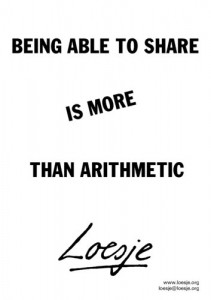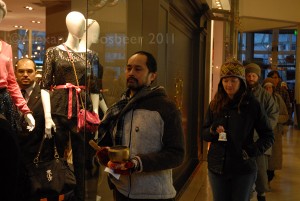Poverty in the global north

Loesje poster about sharing. Loesje is an international movement which started in The Netherlands (Loesje is a Dutch girls' name) to spread ideas creatively. (See www.loesje.org)
I am on the road again, travelling to take photos in the eastern part of Oregon state. It’s hard to be moving on every night. I am rounding off a few tasks before departing for Nicaragua in a week’s time, and carting boxes of things from a car to a temporary abode gives me a sense of what it would be like to be involuntarily homeless. (It’s amazing how a few files, clothes, and a few computer accessories suddenly becomes four trips from the car.) Worse than that, the lack of opportunity to stop, rest, and let all the tiny muscles in your shoulders and arms just droop and relax – to truly rest – seems debilitating.
How do people face the insecurity of involuntary homelessness? The Portland teachers’ letter referred to my post on ‘Freedom of Expression’ states that ”55 percent of all American children live in families that are near poverty”. That is a horrifying number – that more than half of the children in the US are part of a family which, if there are four in the family, live on less than US$22,350 in 2011. But, hang on, that’s US$15 per day per family member, to cover food, lodging, health care (even if not health insurance)…. My experience in Portland, Oregon, as a single person, was that the minimum needed for food, lodging, and health care, was more than twice that, and this sum does not include transport, clothes, books for school, or other necessary items. According to Wikipedia, the US Census Bureau reports that 49.6 million people in America were living in poverty in 2010.
It’s very odd that in the very same country where so many people cannot afford shelter over their heads, where most people I meet in Portland did not have medical cover (and one has stopped cycling due to not being able to afford any care if she had an accident), that people are obsessed with buying. It’s almost like a magical ritual, staving off the specter of poverty with a wall of buying. Unfortunately, this buying is not only causing social problems with people developing debt problems, but with the environment. Do we really need flat screen TVs? Consider that their production is a hefty contributor to global warming (see this Guardian article). Then there is the fact that many of the recent electronic innovations rely on scare metals that many of us never even knew existed. recycling programs have popped up to re-capture some of these elements, but replacing your TV and car also contributes to waste. With the buying, the replacement with newer models, with planned obsolescence by manufacturers, we are all participating in destruction of the environment from which we derive all of our resources, from food to air to water to flat screen TVs.
I participated in a performance art action on the last-day-to-shop-but-one before Christmas, walking very slowly through a shopping mall and sporadically ringing bells. The action of having so much time to think between steps, of not having any excuse to step out of the line, no opportunity to decide to check my e-mail or list of things to do, had wonderful effect. The slow walking, the ringing of the bell – reminiscent of the alms walk of Buddhist monks – had the effect of creating a meditation.

Meditative action of slow walk with bells, encouraging people to think about giving love instead of things for Christmas.
I put a photo of the action on a Quaker page in Facebook, and one person asked how it was possible to show love from a distance. Were they joking? I sincerely hope so! I wholeheartedly hope our world has not become so hooked on things, that listening well and really knowing another have been forgotten as authentic ways to show, and enact, love. Perhaps you have seen somewhere the wonderful quote about humankind now using people and loving things, instead of the more appropriate using thing and loving people.
Stopping and having time to think is anathema to many who are busy creating, and catering to, consumer demand. The speed of life – the rush in the car from one place to another – is quite noticeable in the US. Rushing stops one from thinking, from having time to think, to ponder the inequality, to imagine what it is like to sleep in the drizzle in a Portland winter, to not be able to get warm and dry. And TVs of course contribute to that, with their stories and ads and claims that the sign-laden Occupy movement has ‘no messages’, to take up your precious mental time and make sure you don’t pause to think, what do I really need to live?

Leave a Reply